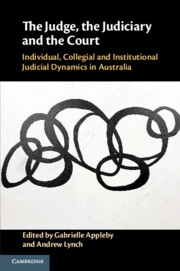 The Judge, the Judiciary and the Court
The Judge, the Judiciary and the Court from Part IV - Perceptions
Published online by Cambridge University Press: 04 May 2021
The relationship between judges and the media has changed. While the hearings and decisions of courts have long been the subject of intense media scrutiny, there was a time when this focus was not usually directed to judges in a personal sense. Judges did not engage with the media in a direct sense. Judges were also discouraged from direct or close contact with the media by many legal principles and professional conventions. The media now treats judges differently, often commenting as much about judges as the cases they decide.Much of the media commentary about judges and their decisions is unfair and inaccurate. As the media has grown more willing to criticise judges and their work, attorneys-general and other politicians have become more reluctant to speak on behalf of judges and the courts. These changes have seen the decline of many of the professional norms that discourage judges from responding to the media but the extent to which judges can or should respond to, or deal with, the media are hampered by the unique nature of the judicial function.
To save this book to your Kindle, first ensure [email protected] is added to your Approved Personal Document E-mail List under your Personal Document Settings on the Manage Your Content and Devices page of your Amazon account. Then enter the ‘name’ part of your Kindle email address below. Find out more about saving to your Kindle.
Note you can select to save to either the @free.kindle.com or @kindle.com variations. ‘@free.kindle.com’ emails are free but can only be saved to your device when it is connected to wi-fi. ‘@kindle.com’ emails can be delivered even when you are not connected to wi-fi, but note that service fees apply.
Find out more about the Kindle Personal Document Service.
To save content items to your account, please confirm that you agree to abide by our usage policies. If this is the first time you use this feature, you will be asked to authorise Cambridge Core to connect with your account. Find out more about saving content to Dropbox.
To save content items to your account, please confirm that you agree to abide by our usage policies. If this is the first time you use this feature, you will be asked to authorise Cambridge Core to connect with your account. Find out more about saving content to Google Drive.